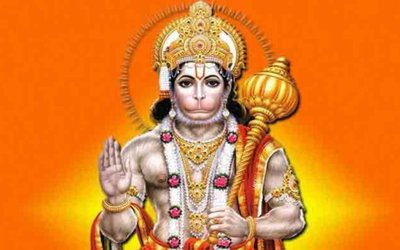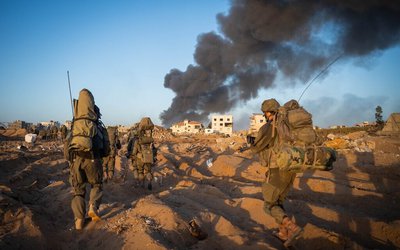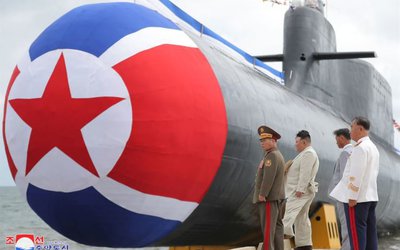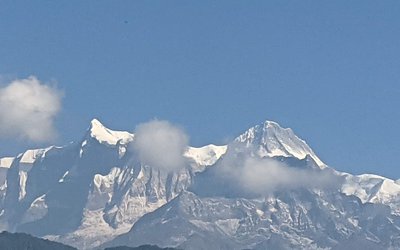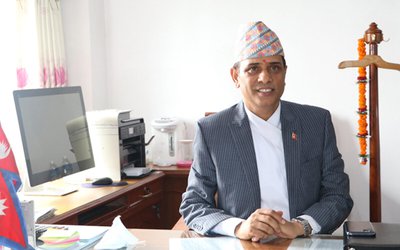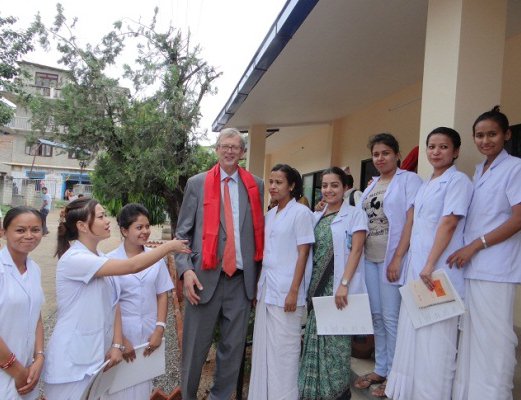
Ambassador of Federal Republic of Germany to Nepal Matthias Meyer spends much of his time doing formal official work in his office in Kathmandu. However, he also attaches a high value to visiting the development projects supported by German government and meeting the ordinary rural folks in far away villages of Nepal. What he likes most about the people of the mountainous areas is their smile in spite of their hardship and difficulties.
Just a few months after he took charge as the ambassador to Nepal, a big earthquake badly shook Nepal, destroying more than half a million houses and hundreds of old and valuable heritage sites and temples. The earthquake turned many parts of rural Nepal flat, causing high casualties and injuries. Ambassador Meyer saw the devastation, pain and agony of the poor people of Nepal from a very close distance. As a major development partner of Nepal, Germany then provided a valuable support during the relief operation and reconstruction phases as well.
Although the earthquake took away the joy and happiness of people for a short time, what the ambassador saw was normalcy and happiness returned in the villages sitting on the lap of the Himalayan ranges, colorful cultures and festivals.
Young Ambassador Meyer had travelled as a backpack tourist by train and bus from the Indian city of Mumbai to Pokhara in 1979. In his young days, he recalled, how he gazed at Mt. Machhapuchhre, Manasalu and Dhaulagiri ranges in Pokhara. Meyer, who worked at the German Chamber of Commerce in Mumbai then, also visited Kathmandu and Patan, where he was attracted by the greenery surrounding the big valley temples and heritage sites.
He visited Nepal the second time following his return to Germany after completing his tour, trekking in Mansarovar and Lhasa, Tibet.
The majestic Himalayas, temples and cultural heritages touched him deeply after young Meyer had made two visits to Nepal as a tourist. Thirty-five years later, Meyer returned to Nepal as the ambassador, heading the Embassy of Federal Republic of Germany in Nepal.
“I am now in a different role. But I continue to have a similar fascination with the Himalayas, mountains and heritage sites that I had then. I love Nepal’s rural landscape and people,” said Ambassador Meyer, who has visited a number districts of Nepal to inspect the ongoing development projects implemented under the support and cooperation of Federal Republic of Germany.
Since his first visit in 1979, Nepal has seen drastic changes, including in the urban landscapes of Kathmandu and Pokhara. However, the changes of urban Nepal have yet to happen in the rural settings and settlements in far away villages.
“All the changes are not necessarily for the better. If you don’t do a big planning, the cities will be ugly. There should be planning for construction of houses to make them better,” said Ambassador Meyer.
Born and grown up in a rural part of Hamburg, ambassador Meyer holds the view that it is always better living together and being with the people.
“First of all, I come from a very small rural place of Germany, living closely with the people and community. This is the reason I always have a feeling for the hearts of the people when I take a tour of the rural areas of Nepal. When I notice agricultural land in rural landscape and people surrounded by agriculture, I feel closer to them. Of course, the conditions are different in Germany and Nepal as poverty in Nepal's rural areas is rampant and it is very difficult for the farmers to live here. I can imagine their pain and difficulties. What is important for them is living together and sharing their pain and happiness. People have the feeling about themselves, their community and country. As a person from the rural part of Germany, it touches me so much, I feel part of it,” said Ambassador Meyer.
Looking closely at the rural life, ambassador Meyer shares his experiences of meeting with the rural people. “Rural life is very much determined by nature. If there is a good harvest, they have the surplus food, if not, they have to sleep with an empty stomach. In western regions like Jumla and Humla, people face food crisis in case there is less rain than needed, their life will be as difficult in case there is too much of rain. More monsoon means more disaster and less means a food crisis. This is a harsh reality and very difficult for the people to cope with. People have to live under natural forces more here than the people do in Germany,” said Ambassador Meyer.
Expecting to visit more districts of Nepal, Ambassador Meyer said, “I should have visited much more. But my job is bound too much to the office, rather than seeing the people and places.”
Ambassador Meyer has visited Nuwakot, Nepalgunj, Jhapa, Chitwan, Mustang, Pokhara and Lumbini to see the ongoing projects in those areas. Mustang and Lumbini, the birthplace of Lord Buddha, have a special place in his heart and mind. Ambassador Meyer wants to visit more places like Ilam.
He sees his visit to Mustang is memorable. “The landscape and surrounding mountains are very impressive but you need some time to see them and feel them. You cannot perceive the beauty of the place in a day or two, you need at least a week,” said the ambassador. "I really find satisfaction living with the local people. Rural areas are not crowded and chaotic like the backyard of Kathmandu but they are really like natural places where they have tried to maintain what they have. People and places always impress me,” said Ambassador Meyer.
As a diplomat, Ambassador Meyer has to wait at least a year to get together with his family members. Father of two, Ambassador Meyer got a chance to have his daughter, who works in Twitter, stay with him for a week in June. “My son is working abroad so it is difficult for him to come. They have just started their jobs and they cannot go for a long vacation. We always meet once a year in Germany. My whole family comes together and we share things,” said Ambassador Meyer.
Love of Farm Life
My home is in Hamburg, a rural area, and I have a farm with horses and other cattle. We grow wheat. I did all farm work before my father sent me to the law school. I know the life of farmers. Many of my friends are still there. After my retirement, I will have more time to spend with them.
Curious People
When I meet the rural people of Nepal, I find them to be normally curious about who I am and what I do. They come to me to share their personal things. Of course, they also demand some programs and projects. Their demand is natural and normal. I see it as positive. Sometimes you miss such things in Germany because they are anonymous and people don’t care much about others.
Germany’s Support
We have been supporting Nepal in sectors of health and energy, particularly alternative energy, and community infrastructure. Another area is cultural heritage. We are very much committed for the restoration and protection of cultural heritage sites in Nepal. They need to be protected from all kinds of intrusion, including earthquakes and other negative things. People need to be educated to help to maintain these heritages.
Private Fund
Along with the government funds, Germany’s private citizens have also been sending funds to Nepal. Private funds are much larger than the public fund as Nepal receives 116 million euro through this. The German government has given 30 million Euro for reconstruction. "You see the level of people to people relations as people are themselves coming to help Nepali people. German citizens give money to educate underprivileged and deprived children. This makes me proud.," said Ambassador Meyer.
Country with Diversity
Nepal is a country of diverse ethnic groups, cultures and religions. There is a diversity of altitudes in the plains, hills and high mountains. Nepal has many local festivals and religious customs. In many other countries such practices are dead. Nepalese are still practicing them in their day to day life. This is also something which is good and needs to be preserved.
Impression of Lumbini
"Lumbini is a very interesting place. I have been there several times as I like it. It was the root of all Buddhism. It is an original place from where the message of Buddhism originated. Buddhism is not a religion but more or less a way of life. This is something which could have positive impact in the country.
Changing Order
Although the buildings are modernized, what I find interesting is people are still following the traditional way of life.
Democratic Process
Democracy is a good system but it is also a costly system. You need to spend money to make institutions. You also need patience. You cannot bring change within a decade or so. It is time consuming. There is the need to create a proper environment for the people to get jobs here so they won't need to go outside for job.
German Prince Waldemar, who came to Nepal in February 1845 as the first German visitor, described the beauty of mountain ranges as seen from Kakani. Similarly, he was impressed by Kathmandu valley’s landscape, settlement, temples and people. Nepal’s mountain remains a major attraction even today for people like ambassador Meyer.

Keshab Poudel
Poudel is the editor of New Spotlight Magazine.
- ECONOMY: Growth At 3.3
- Apr 16, 2024
- DPM’s SHRESTHA’S CHINA VISIT High Profile, Low Key
- Apr 14, 2024
- Maha Kumbha In Barahkshetra: A Sacred Festival In Sacred Koshi (Kaushiki) River
- Apr 09, 2024
- LOSS AND DAMAGE: Upper Tamakoshi A Case
- Apr 02, 2024
- Helvetas-Nepal’s InElam Promoting Herbal Oil In Sarlahi
- Mar 31, 2024







